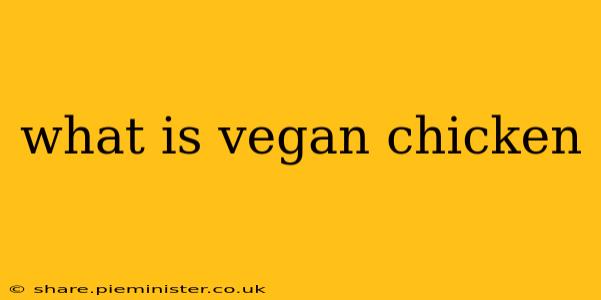Vegan chicken, a rapidly growing segment of the plant-based food market, refers to meat substitutes designed to mimic the taste, texture, and appearance of chicken. Unlike traditional chicken, which comes from poultry, vegan chicken is entirely plant-based, offering a cruelty-free and often more sustainable alternative. This burgeoning category encompasses a variety of products, each with its unique production method and resulting characteristics.
How is Vegan Chicken Made?
The creation of vegan chicken involves a fascinating array of techniques, with manufacturers employing various plant proteins as the base. Some of the most common include:
-
Soy: Soy protein is a foundational ingredient in many vegan chicken products, providing a relatively neutral flavor that easily absorbs seasonings and marinades. Its ability to mimic the texture of chicken makes it a popular choice.
-
Pea Protein: Pea protein offers a mild flavor and is often lauded for its sustainability. It’s becoming increasingly popular in vegan chicken products, offering a lighter and potentially less processed alternative to soy.
-
Wheat Gluten (Seitan): Known for its chewy texture, seitan is another common base for vegan chicken. It provides a more robust, meaty texture compared to soy or pea protein, but its distinctive flavor requires careful seasoning and blending.
-
Mushrooms: Certain types of mushrooms, such as oyster mushrooms, are sometimes incorporated to enhance the texture and umami flavor profile. They contribute to a "meatier" mouthfeel.
-
Other Plant-Based Ingredients: Manufacturers often blend these primary protein sources with various other ingredients to achieve the desired taste, texture, and nutritional profile. These additions might include coconut oil, starches, vegetables, and flavorings.
What are the Different Types of Vegan Chicken?
The market showcases a wide variety of vegan chicken options, each offering a unique culinary experience:
-
Vegan Chicken Nuggets: These are a popular choice, closely mimicking the familiar texture and crispy coating of traditional chicken nuggets.
-
Vegan Chicken Breast: Often used as a meat substitute in recipes like stir-fries or salads, these are designed to resemble the texture and taste of chicken breast.
-
Vegan Chicken Patties/Burgers: Suitable for sandwiches or as a standalone patty, these offer a convenient and tasty option.
-
Vegan Chicken Strips: Similar to nuggets but often longer and thinner, these are great for dipping or adding to salads.
-
Vegan Chicken Pieces (e.g., for curries): Specifically designed for dishes that call for shredded or diced chicken, these cater to the needs of those cooking diverse ethnic cuisines.
Is Vegan Chicken Healthy?
The nutritional content of vegan chicken varies significantly depending on the brand and specific ingredients. While generally lower in saturated fat and cholesterol than traditional chicken, it’s crucial to check nutrition labels. Some products might be higher in sodium or processed ingredients. Many brands are fortified with vitamins and minerals, making them a good source of protein and other essential nutrients. However, it's always best to choose products with minimal processing and added ingredients.
What are the Environmental Benefits of Vegan Chicken?
Compared to traditional chicken production, vegan chicken often boasts a smaller environmental footprint. Chicken farming contributes significantly to greenhouse gas emissions, deforestation, and water pollution. Plant-based alternatives generally require fewer resources, generating less waste and contributing to a more sustainable food system. However, it's crucial to consider the sustainability of the specific ingredients used and the overall production process.
How Does Vegan Chicken Taste?
The taste of vegan chicken is continually improving as technology advances. While early iterations had a somewhat bland or artificial taste, many modern products closely replicate the flavor and texture of real chicken, particularly when properly seasoned and prepared. Some brands might have a slightly "meaty" or "umami" flavor derived from the base ingredients, while others strive for a more neutral taste that readily absorbs seasonings.
Is Vegan Chicken Expensive?
The price of vegan chicken varies considerably depending on the brand, retailer, and specific product. While some options are priced competitively with traditional chicken, others might be more expensive. However, costs are generally decreasing as the market expands and production becomes more efficient.
Where Can I Buy Vegan Chicken?
Vegan chicken is becoming increasingly accessible. It's available in many mainstream supermarkets, health food stores, and online retailers. The availability varies by region, but the options are consistently growing.
This comprehensive overview should provide a solid understanding of vegan chicken and its place within the ever-evolving landscape of plant-based foods. Remember to always check nutrition labels and choose brands that align with your individual dietary needs and preferences.
